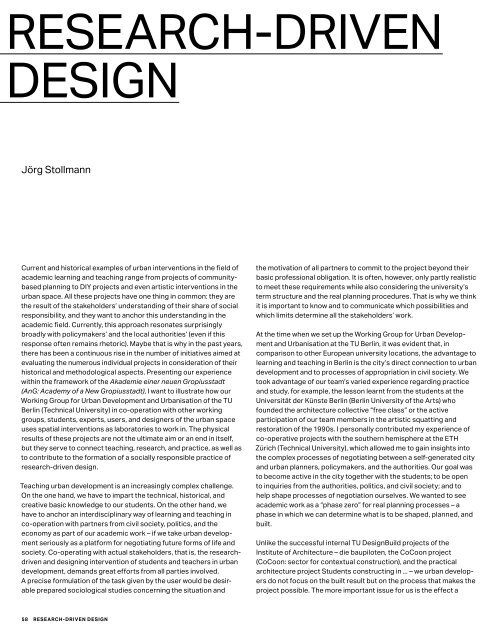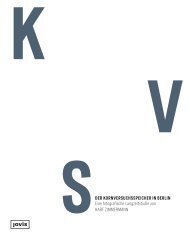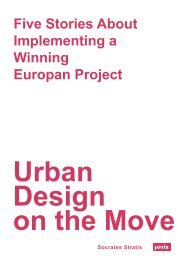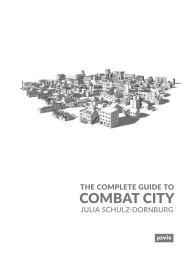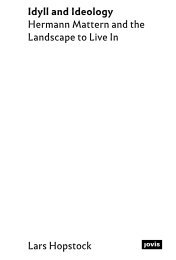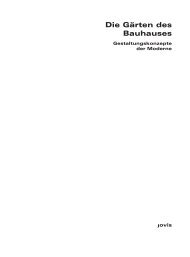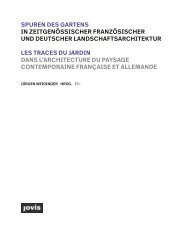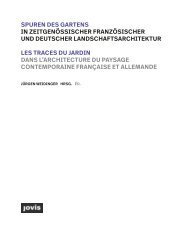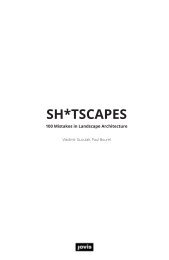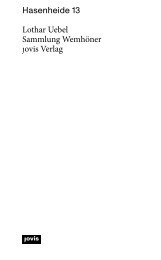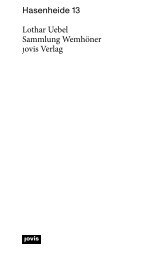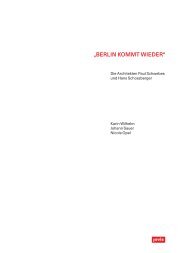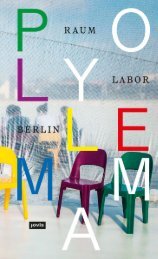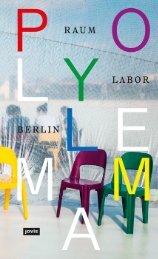Transforming Cities
978-3-86859-337-2
978-3-86859-337-2
Sie wollen auch ein ePaper? Erhöhen Sie die Reichweite Ihrer Titel.
YUMPU macht aus Druck-PDFs automatisch weboptimierte ePaper, die Google liebt.
RESEARCH-DRIVEN<br />
DESIGN<br />
Jörg Stollmann<br />
Current and historical examples of urban interventions in the field of<br />
academic learning and teaching range from projects of communitybased<br />
planning to DIY projects and even artistic interventions in the<br />
urban space. All these projects have one thing in common: they are<br />
the result of the stakeholders’ understanding of their share of social<br />
responsibility, and they want to anchor this understanding in the<br />
academic field. Currently, this approach resonates surprisingly<br />
broadly with policymakers’ and the local authorities’ (even if this<br />
response often remains rhetoric). Maybe that is why in the past years,<br />
there has been a continuous rise in the number of initiatives aimed at<br />
evaluating the numerous individual projects in consideration of their<br />
historical and methodological aspects. Presenting our experience<br />
within the framework of the Akademie einer neuen Gropiusstadt<br />
(AnG: Academy of a New Gropiusstadt), I want to illustrate how our<br />
Working Group for Urban Development and Urbanisation of the TU<br />
Berlin (Technical University) in co-operation with other working<br />
groups, students, experts, users, and designers of the urban space<br />
uses spatial interventions as laboratories to work in. The physical<br />
results of these projects are not the ultimate aim or an end in itself,<br />
but they serve to connect teaching, research, and practice, as well as<br />
to contribute to the formation of a socially responsible practice of<br />
research-driven design.<br />
Teaching urban development is an increasingly complex challenge.<br />
On the one hand, we have to impart the technical, historical, and<br />
creative basic knowledge to our students. On the other hand, we<br />
have to anchor an interdisciplinary way of learning and teaching in<br />
co-operation with partners from civil society, politics, and the<br />
economy as part of our academic work – if we take urban development<br />
seriously as a platform for negotiating future forms of life and<br />
society. Co-operating with actual stakeholders, that is, the researchdriven<br />
and designing intervention of students and teachers in urban<br />
development, demands great efforts from all parties involved.<br />
A precise formulation of the task given by the user would be desirable<br />
prepared sociological studies concerning the situation and<br />
the motivation of all partners to commit to the project beyond their<br />
basic professional obligation. It is often, however, only partly realistic<br />
to meet these requirements while also considering the university’s<br />
term structure and the real planning procedures. That is why we think<br />
it is important to know and to communicate which possibilities and<br />
which limits determine all the stakeholders’ work.<br />
At the time when we set up the Working Group for Urban Development<br />
and Urbanisation at the TU Berlin, it was evident that, in<br />
comparison to other European university locations, the advantage to<br />
learning and teaching in Berlin is the city’s direct connection to urban<br />
development and to processes of appropriation in civil society. We<br />
took advantage of our team’s varied experience regarding practice<br />
and study, for example, the lesson learnt from the students at the<br />
Universität der Künste Berlin (Berlin University of the Arts) who<br />
founded the architecture collective “free class” or the active<br />
participation of our team members in the artistic squatting and<br />
restoration of the 1990s. I personally contributed my experience of<br />
co-operative projects with the southern hemisphere at the ETH<br />
Zürich (Technical University), which allowed me to gain insights into<br />
the complex processes of negotiating between a self-generated city<br />
and urban planners, policymakers, and the authorities. Our goal was<br />
to become active in the city together with the students; to be open<br />
to inquiries from the authorities, politics, and civil society; and to<br />
help shape processes of negotiation ourselves. We wanted to see<br />
academic work as a “phase zero” for real planning processes – a<br />
phase in which we can determine what is to be shaped, planned, and<br />
built.<br />
Unlike the successful internal TU DesignBuild projects of the<br />
Institute of Architecture – die baupiloten, the CoCoon project<br />
(CoCoon: sector for contextual construction), and the practical<br />
architecture project Students constructing in ... – we urban developers<br />
do not focus on the built result but on the process that makes the<br />
project possible. The more important issue for us is the effect a<br />
58 RESEARCH-DRIVEN DESIGN


